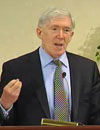
As momentum builds on Capitol Hill and among the Congo advocacy community in support of legislation that would make the lucrative trade in minerals from eastern Congo more transparent, a key State Department official came out this week strongly in favor of concerted action from the U.S. government.
Undersecretary of State for Economic, Energy, and Agricultural Affairs Robert Hormats was the featured speaker on a panel on responsible resources trade at the Center for Strategic and International Studies on Tuesday.
A video of the full event is now available online, but Hormats’ opening remarks in particular are worth highlighting because they touch on the wide range of angles through which the conflict minerals trade must be tackled to have a meaningful and lasting impact.
“We have to promote transparency, accountability, and the rule of law within state authority so that people can trust government to affirm their rights,” Hormats said. “We have to build the capacity of civil society to demand a future without corruption—one that cements the gains of a meaningful democracy. And we must strengthen the infrastructure for legitimate trade, investment, and economic growth.”
Hormats explained that the State Department views conflict minerals as an important piece of its wider strategy for engaging in Congo. According to the “strategic action plan” for conflict minerals that Hormats laid out, the State Department will raise awareness about the issue, boost diplomatic efforts to target the trade, encourage responsible natural resources trade, support the U.N. mission in the east, build capacity within the Congolese government, and protect artisanal miners and mining communities.
But one colleague, who recently returned from the region, aptly pointed out a crucial missing piece in the approach Hormats outlined that will hamper its effectiveness in both the short- and long-term. "We need to be firm in recognizing that several companies and governments are still invested in the conflict minerals trade today and that it will take a harder push to dislodge them,” commented Sasha Lezhnev of Grassroots Reconciliation Group. “It is only with serious signals from the U.S. government and major end-users like electronics and jewelry companies, that they will not accept anything less than serious, independently verified minerals, that will force the bad apples to change,” he wrote in an email.
Looking ahead, Hormats pointed out that if these efforts successfully create a system that can “withstand external forces” that lead to the blights Congo faces today, it could become a model to replicate in other contexts where local populations are unable to reap the benefits of resource wealth – or worse, where natural riches serve those perpetrating atrocities. That’s optimistic thinking indeed, but it reassuringly conveys that Hormats and team view Congo’s struggle with conflict minerals as both a priority in its own right and as a opportunity to break new ground in the way resources are responsibly traded.
So far, the State Department has been conspicuously quiet about the legislation pending in both the House and Senate that would address the issue of conflict minerals. Signaling its support for these concrete efforts to make the mineral trade more transparent is an important place to start.
Photo: U.S. Undersecretary of State for Economic, Energy, and Agricultural Affairs Robert Hormats at CSIS (screengrab)

